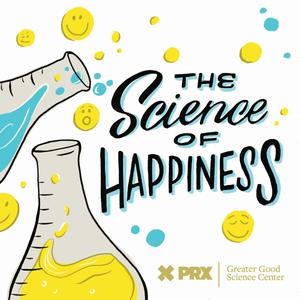
The Science of Happiness
Shuka Kalantari
Learn research-tested strategies for a happier, more meaningful life, drawing on the science of compassion, gratitude, mindfulness, and awe. Hosted by award-winning psychologist Dacher Keltner. Co-produced by PRX and UC Berkeley's Greater Good Science Center.
- 19 minutes 42 secondsAre You Remembering The Good Times?
Link to Transcript: https://tinyurl.com/2r63e6tn
Episode summary:
Whether it’s news notifications or work emails, it’s easy to feel overwhelmed by the stresses of our time every moment of every day. But what if there was something we could do to rekindle the greatest joys of our pasts? How might that shift how we feel in the present moment? Simply reflecting on happy memories has been shown in a lab to reduce stress, activate the reward center in our brain, and uplift our mood. This week, Palestinian-American poet and author Naomi Shihab Nye reminisces on happy memories from her youth and finds the practice soothes her and sparks joyfulness. We also hear from neuroscientist Mauricio Delgado about how the practice changes the way we think and feel, and which types of happy memories serve us best.
Practice:
For one week or more, spend 5-10 minutes each day writing in response to the following prompt:
Think about good memories you have from your past. Write a few paragraphs describing them and one event that you still remember to this date. Please provide as many details as possible, including who was there, so that another person reading what you wrote could understand how you felt at that time.
Today’s guests:
Naomi Shihab Nye is a Palestinian-American poet and author. Her new book of poetry, Grace Notes, will be available May 7.
Order Grace Notes: https://tinyurl.com/st3w6n8t
Check out Naomi’s children’s book about a child visiting her Palestinian grandmother, Sitti’s Secrets: https://tinyurl.com/5embjxuj
Follow Naomi on Instagram: https://tinyurl.com/5hddcf8k
Mauricio Delgado is a psychology professor at Rutgers University who studies social and cognitive neuroscience.
Learn more about Mauricio’s work: https://tinyurl.com/4tt7bp2d
Follow Mauricio on Twitter: https://tinyurl.com/27kvv6j7
More episodes like this one:
Why We Should Look Up at the Sky - https://tinyurl.com/4xs88sye
Why We Need Friends with Shared Interests - https://tinyurl.com/bdesh3he
Related Happiness Breaks:
A Meditation to Connect to Your Roots, With Yuria Celidwen - https://tinyurl.com/3ae3w3z3
Where Did You Come From? Guided Writing, With Lyla June - https://tinyurl.com/ytypxn5t
Tell us about your happiest childhood memories, and what they bring to you now. Email us at [email protected] or use the hashtag #happinesspod.
Help us share The Science of Happiness!
Leave us a 5-star review on Apple Podcasts and share this link with someone who might like the show: https://tinyurl.com/2p9h5aap
25 April 2024, 10:00 am - 7 minutesHappiness Break: A Walking Meditation with Dan Harris of 10% Happier
Happiness Break: April 18, 2024 A walking meditation led by 10% Happier Host Dan Harris
How to Do This Practice:
Begin walking.
Bring your awareness to the present moment, noticing sights and sounds around you. When your mind wanders to worries or other thoughts, gently bring yourself back to what you notice around you.
See if you can notice the sensations in your leg as you take each step.
Continue walking this way as long as you wish.
Today’s Happiness Break host:
Dan Harris the host of 10% Happier, a podcast about mindfulness and other practices and thoughts that can support our well-being.
Check out Dan’s podcast, 10% Happier: https://tinyurl.com/48cxcbjm\
Order his most recent book, Meditation for Fidgety Skeptics: A 10% Happier How-to Book: https://tinyurl.com/44cmjuvdFollow Dan on Twitter: https://twitter.com/danbharris
Follow Dan on Instagram: https://www.instagram.com/danharris/
If you enjoyed this Happiness Break, you may also like:
Moving Through Space, With Dacher Keltner - https://tinyurl.com/5n8dj5v6
Check out these episodes of The Science of Happiness about walking and mind-body awareness.
How To Do Good For The Environment (And Yourself) (Walking, With Diana Gameros) - https://tinyurl.com/3zfhhpus
How To Focus Under Pressure (Mindful Body Scan, With Amy Schneider) - https://tinyurl.com/5fkdre2v
We love hearing from you! Tell us about your experiences with mindful walking. Email us at [email protected] or use the hashtag #happinesspod.
Find us on Spotify: https://tinyurl.com/6s39rzus
Help us share Happiness Break! Rate us and copy and share this link: https://tinyurl.com/6s39rzus
We're living through a mental health crisis. Between the stress, anxiety, depression, loneliness, burnout — we all could use a break to feel better. That's where Happiness Break comes in. In each biweekly podcast episode, instructors guide you through research-backed practices and meditations that you can do in real-time. These relaxing and uplifting practices have been shown in a lab to help you cultivate calm, compassion, connection, mindfulness, and more — what the latest science says will directly support your well-being. All in less than ten minutes. A little break in your day.
18 April 2024, 10:00 am - 15 minutes 59 secondsHow To Make Work More Satisfying
Finding ways to bend tasks toward your strengths and passions can make you happier, more productive and find more meaning in your life — no matter your job.
Link to episode transcript: https://tinyurl.com/4ky325rs
Episode summary:
When the poet and former professor Susan Glass first retired, she stacked her days with so many volunteer gigs and passion projects, she felt like she was working harder than ever before. Now, she wants to prioritize living a life of meaning and enjoyment. Susan tried a lab-tested practice called Job Crafting, where you take stock of the tasks that fill your day, how much time and energy they require, what really lights you up, and what changes you can make to better align your efforts at work (or in your free time) with your genuine strengths and passions. Then we hear from researcher Maria Tims about how Job Crafting doesn’t just benefit your own well-being and help to guard against burnout, it can also boost your whole team’s productivity and morale.
Practice:
Create a “before” sketch: List all your regular tasks, and note each one as low, medium, or high in terms of the time and energy you actually devote to them.
Reflect on and write down what motivates you, what your strengths are, and what you’re passionate about.
Create a more ideal (but still realistic) "after" diagram, shifting draining tasks from “high” to “low” or “medium” if possible, and boosting energizing and enjoyable tasks where you can.
Create an action plan: What are some concrete changes that are in your power to make? Are there places where you need to ask for the support of a colleague or supervisor to make a change?
Learn more about this practice at Greater Good In Action:
https://ggia.berkeley.edu/practice/job_crafting
Today’s guests:
Susan Glass is a retired English professor and visually impaired, Bay Area-based poet. She’s the author of the poetry book “The Wild Language of Deer.”
Read Susan’s book: https://pod.link/sleep-with-me
Learn more about Susan’s life and work: https://tinyurl.com/j3pcjn6r
Maria Tims is a professor of Management and Organization at the University of Amsterdam School of Business and Economics.
Learn more about her work: https://tinyurl.com/mtp7tpy3
Resources from The Greater Good Science Center:
How to Make Life More Meaningful (The Science of Happiness Podcast) https://tinyurl.com/39pth57f
How to Be More Engaged at Work: https://tinyurl.com/2s3t5x2c
How Oxytocin Can Make Your Job More Meaningful: https://tinyurl.com/mrx8458h
Four Keys to a Healthy Workplace Hierarchy: https://tinyurl.com/788m6tme
More Resources for Improving the Job You Have:
HBR - What Job Crafting Looks Like: https://tinyurl.com/453yamac
LSE - Can workers really craft their own happiness in the job? https://tinyurl.com/yjavhda9
TED - The Power of Personalising Our Work: https://tinyurl.com/4cvznn8v
Tell us about your experiences finding meaning in your day-to-day tasks. Email us at [email protected] or use the hashtag #happinesspod.
Help us share The Science of Happiness!
Leave us a 5-star review and share this link with someone who might like the show: https://tinyurl.com/2p9h5aap
11 April 2024, 10:00 am - 7 minutes 25 secondsHappiness Break: A Meditation To Move Through Anger, With Eve Ekman
Accepting difficult feelings like anger or irritation can help us keep our cool, feel better overall, and find calm on the other side.
Link to episode transcript: https://tinyurl.com/n6hm5yhz
How to Do This Practice:
Begin the practice by settling your mind and body. Notice your breath and any sensations that arise in your body,
Shift your attention away from your body, recalling an instance where you felt mildly irritated or frustrated. Give yourself a few moments to fully feel this emotion.
Notice any physical sensations that arise. Then, release that memory, refocusing your attention on the body.
Allow these sensations to shift and move, giving them the space to change and observing them with a sense of curiosity and kindness.
Consider shaking hands with the emotion the next time it arises in your daily life.
Today’s Happiness Break host:
Eve Ekman is a contemplative social scientist and meditation teacher from San Francisco, California.
Learn more about Eve’s work: https://tinyurl.com/2vhuarh8
Find out about Eve’s Emotional trainings with Cultivating Emotional Balance: https://tinyurl.com/5n95m7yx
Explore Eve’s Project, The Atlas of Emotions: https://tinyurl.com/mt75ytm3
Follow Eve on Facebook: https://tinyurl.com/3txahape
More resources from The Greater Good Science Center:
How to Regulate Your Emotions Without Suppressing Them: https://tinyurl.com/4x29denx
What to Do When You Feel Stuck in Negative Emotions: https://tinyurl.com/mwczxfya
How to Turn Your Brain from Anger to Compassion: https://tinyurl.com/57upkcfa
How to Overcome Destructive Anger: https://tinyurl.com/49zu6whw
We love hearing from you! How do you manage your emotions? Email us at [email protected] or use the hashtag #happinesspod.
Find us on Spotify: https://tinyurl.com/6s39rzus
Help us share Happiness Break! Rate us and copy and share this link: https://tinyurl.com/6s39rzus
We're living through a mental health crisis. Between the stress, anxiety, depression, loneliness, burnout — we all could use a break to feel better. That's where Happiness Break comes in. In each biweekly podcast episode, instructors guide you through research-backed practices and meditations that you can do in real-time. These relaxing and uplifting practices have been shown in a lab to help you cultivate calm, compassion, connection, mindfulness, and more — what the latest science says will directly support your well-being. All in less than ten minutes. A little break in your day.
4 April 2024, 10:00 am - 17 minutes 15 secondsHow To Talk To People You Disagree With
We learn techniques for working across the aisle without compromising our values from a Democratic politician in one of the most conservative states, Oklahoma.
Link to episode transcript: https://tinyurl.com/w2a9a42p
Episode summary:
Trying to have a conversation with someone who has an opposing view can be exhausting. This week, we explore what it means to have productive discussions when we disagree. Democratic Oklahoma State Senator Jo Anna Dossett recounts her experience bridging political divides with Republican senators in her state with active listening and self-compassion. Later, we hear from political science professor Lilliana Mason about the blurred line between personal and political identities, and how connecting with individuals on an emotional and social level can lead to more fruitful discussions than just focusing on facts.
Today’s guests:
Jo Anna Dossett is an Oklahoma State Senator.
Learn about Jo Anna Dossett: https://tinyurl.com/muxw7yvz
Follow Jo Anna Dossett on Twitter: https://twitter.com/dossett4ok
Follow Jo Anna Dossett on Instagram: https://tinyurl.com/293n98fc
Follow Jo Anna Dossett on Facebook: https://tinyurl.com/yc3mszhx
Lilliana Mason is a political science professor at Johns Hopkins University.
Learn about Lilliana Mason’s work: https://tinyurl.com/w2hy6fhk
Follow Lilliana Mason on Twitter: https://tinyurl.com/29sumyxb
Resources from The Greater Good Science Center:
Eight Keys to Bridging Our Differences: https://tinyurl.com/45ntehyp
Four Lessons From Mediators for Bridging Differences: https://tinyurl.com/bdhf68te
What Will It Take to Bridge Our Differences? https://tinyurl.com/3sua8uz5
Six Techniques to Help You Bridge Differences: https://tinyurl.com/ypsbycf4
15 Practices to Help Kids Bridge Differences: https://tinyurl.com/mvw4s649
More Resources on Bridging Differences
TIME - How Americans Can Tackle Political Division Together: https://tinyurl.com/3phj6y7j
APA - Healing the political divide: https://tinyurl.com/38kzvm5k
BBC - Crossing Divides: What the research tells us: https://tinyurl.com/yahmwdth
Stanford - How to Bridge Political Divides: https://tinyurl.com/yc7ha55p
Tell us about your experiences and struggles bridging differences. Email us at [email protected] or use the hashtag #happinesspod.
Help us share The Science of Happiness!
Rate us on Spotify and share this link with someone who might like the show: https://tinyurl.com/d3mc7e6t
28 March 2024, 10:00 am - 4 minutes 55 secondsHappiness Break: Tap into the Joy that Surrounds You, With Anushka Fernandopulle
Beyond just feeling good, studies show experiencing other people's joy makes us more compassionate and satisfied with life.
Link to episode transcript: https://tinyurl.com/43e35j37
How to Do This Practice:
Find a comfortable position to begin this practice, focusing on your breath.
Visualize a person or situation that brings you a sense of joy or happiness. It might be a child laughing, the success of a friend, or even a dog wagging its tail.
Connect with their joy and happiness, wishing them well.
Expand your focus to larger groups of people, like a team winning a match, wishing them well.
Consider repeating this practice when you want to connect your sense of happiness with others.
Today’s Happiness Break host:
Anushka Fernandopulle is a Buddhist meditation teacher and leadership coach.
Learn More about Anushka: https://www.anushkaf.org/about/
Follow Anushka on Instagram: https://www.instagram.com/anushka_dharma/
Follow Anushka on Twitter: https://twitter.com/anushkaf
More resources from The Greater Good Science Center:
Happiness Break: Wishing Others’ Well, With Anushka Fernandopulle: https://tinyurl.com/jrkewjs8
What Is Sympathetic Joy and How Can You Feel More of It? https://tinyurl.com/yuzmykct
How to Overcome Stress by Seeing Other People’s Joy: https://tinyurl.com/4csukyd5
Can Little Steps Lead to Big Joy? https://tinyurl.com/3e5yt3hp
Why Experiencing Joy and Pain in a Group Is So Powerful: https://tinyurl.com/3trjtzfm
We love hearing from you! Tell us about your experience of appreciating others’ joy. Email us at [email protected] or use the hashtag #happinesspod.
Find us on Spotify: https://tinyurl.com/3bj4637f
Help us share Happiness Break! Leave us a 5-star review and copy and share this link: https://tinyurl.com/2p9h5aap
We're living through a mental health crisis. Between the stress, anxiety, depression, loneliness, burnout — we all could use a break to feel better. That's where Happiness Break comes in. In each biweekly podcast episode, instructors guide you through research-backed practices and meditations that you can do in real-time. These relaxing and uplifting practices have been shown in a lab to help you cultivate calm, compassion, connection, mindfulness, and more — what the latest science says will directly support your well-being. All in less than ten minutes. A little break in your day.
21 March 2024, 10:00 am - 16 minutes 40 secondsWho’s Always There for You?
When we remember the times someone had our back, it changes the way we view ourselves and the world. Our guest explores what happens when trying a practice to feel more supported.
Link to episode transcript: https://tinyurl.com/mrpyr8a7
Episode summary:
Ever since he was a young child, José Valladares has spent his life caring for others and has taken pride in supporting his family and community, For our show, he tried a practice where he recalled people in his life who he can turn to during a difficult moment — the people who support him. As he wrote about their admirable qualities and specific instances where they helped him, José felt a renewed sense of gratitude and energy to persist forward in helping others. Later, we hear from psychologist Angela Rowe about how feeling supported can impact our relationships and sense of personal empowerment.
Practice:
Make a list of the people who offer you comfort or security.
Write down six positive qualities that are common to some or all of these people.
Next, recall and visualize a specific situation when you felt distressed or worried, and one of these people comforted and helped you.
Write a brief description of that situation and how you felt during it.
Learn more about this practice at Greater Good In Action:
https://ggia.berkeley.edu/practice/feeling_supported
Today’s guests:
José Valladares is a software engineer in Utah originally from Honduras.
Angela Rowe is a psychology professor at the University of Bristol.
Learn more about Angela’s work: https://tinyurl.com/4nh752ad
Resources from The Greater Good Science Center:
Happiness Break: Who Takes Care of You? With Dacher Keltner: https://tinyurl.com/bdezwwyd
How to Let Someone Love You (The Science of Happiness Podcast): https://tinyurl.com/5xtzbzj2
Four Ways Social Support Makes You More Resilient: https://tinyurl.com/2p9zkjpj
Just One Thing: Feel the Support: https://tinyurl.com/yrfnmwfv
Friend or Family? https://tinyurl.com/msbs2kuh
More Resources on Feeling Supported
NYT Times - Are You Anxious, Avoidant or Secure? https://tinyurl.com/yes746sv
The Atlantic - The Trait That ‘Super Friends’ Have in Common: https://tinyurl.com/bdheumdh
BBC - Why friendship makes us healthier: https://tinyurl.com/3596n4u7
TED - How to ask for help -- and get a "yes": https://tinyurl.com/2ybrmt7m
Stanford - Asking for help is hard, but people want to help more than we realize, Stanford scholar says’: https://tinyurl.com/4n4hraj5'
Who do you turn to for support in your life? Email us at [email protected] or use the hashtag #happinesspod.
Help us share The Science of Happiness!
Rate us on Spotify and share this link with someone who might like the show: https://tinyurl.com/b6779syt
14 March 2024, 10:00 am - 9 minutes 27 secondsHappiness Break: Where Did You Come From? Guided Writing With Lyla June
Indigenous artist Lyla June leads a 5-minute freewriting exercise about our personal journeys. Autobiographical writing has been shown to help do better in relationships and feel more satisfied in life.
Link to episode transcript: https://tinyurl.com/3622n5s6
How to Do This Practice:
You will need writing utensils for this practice.
Find a comfortable place to start this writing practice, taking a few moments to ground yourself.
Write the prompt, “I come from a place where…”
For the next 5 minutes (or more), write whatever comes to mind, allowing your thoughts and ideas to flow freely, without judgment or filters. Trying keeping your pen to the paper the whole time.
Take some time afterward to read and reflect on what you wrote.
Consider repeating this exercise every few weeks or months to reflect on your past and prospective future.
Today’s Happiness Break host:
Lyla June is an Indigenous artist and scholar from the Diné Nation.
Learn about Lyla June’s work: [https://www.lylajune.com/>\
Watch Lyla June’s videos: [https://tinyurl.com/bdhbwyru>\
Follow Lyla June on Twitter: [https://tinyurl.com/4pj565d6>\
Follow Lyla June on Instagram: https://tinyurl.com/4pj565d6More resources from The Greater Good Science Center:
The Power of Expressing Your Deepest Emotions (The Science of Happiness Podcast): [https://tinyurl.com/2uzh3r67>\
How to Journal Through Your Struggles: [https://tinyurl.com/yua6wkwd>\
How Journaling Can Help You in Hard Times: [https://tinyurl.com/3zv3hunw>\
How Creative Writing Can Increase Students’ Resilience: https://tinyurl.com/4xw8xuffHow was your experience with this freewriting exercise? Email us at [email protected] or use the hashtag #happinesspod.
Find us on Spotify: https://tinyurl.com/ycukc4za
Help us share Happiness Break! Leave us a 5-star review and copy and share this link: https://tinyurl.com/2p9h5aap
We're living through a mental health crisis. Between the stress, anxiety, depression, loneliness, burnout — we all could use a break to feel better. That's where Happiness Break comes in. In each biweekly podcast episode, instructors guide you through research-backed practices and meditations that you can do in real-time. These relaxing and uplifting practices have been shown in a lab to help you cultivate calm, compassion, connection, mindfulness, and more — what the latest science says will directly support your well-being. All in less than ten minutes. A little break in your day.
7 March 2024, 11:00 am - 19 minutes 29 secondsWhy Grownups Should Be Playful Too
Playfulness can improve your relationships, help you excel at work, and reduce stress. We explore a strategy shown to help you become more playful.
Link to episode transcript: http://tinyurl.com/b5xc78r3
Episode summary:
Patricia Mebrahtu used to have so much fun as a child. Now, as a medical assistant and mother of two young children, she found herself feeling burnt out and irritable. For our show, Patricia tried a practice to infuse more playfulness into her life. From singing karaoke with her family to playing in the rain, she tapped into her inner child. Through this practice, Patricia recognized the importance of taking time out for yourself, and that she can carve out opportunities to have fun and be playful, even as a busy adult. Later, we hear from psychologist René Proyer about the different types of playfulness, and how incorporating play can benefit our sense of wellbeing.
Practice:Each day for a week, incorporate one playful activity into your routine – it can be anything you find enjoyable and playful.
Every evening, write about the experience, and how it made you feel in the present moment.
Today’s guests:
Patricia Mebrahtu is a mother and medical assistant in California.
René Proyer is a psychologist from the Martin-Luther University Halle-Wittenberg.
Learn about René’s work: http://tinyurl.com/4sa9vye9
Follow René on Twitter: http://tinyurl.com/3x5986u6
Resources from The Greater Good Science Center:
Can We Play? http://tinyurl.com/prhv22rf
What Playfulness Can Do for Your Relationship: http://tinyurl.com/n9b3h7e4
Tuesday Tip: Play with Some Friends: http://tinyurl.com/mu837nwr
More Resources on Being Playful:
BBC - Playtime: Is it time we took 'play' more seriously? http://tinyurl.com/4jmx89vn
NYT - Why We All Need to Have More Fun: http://tinyurl.com/335z4bdu
Washington Post - Why it’s good for grown-ups to go play: http://tinyurl.com/5w8shen
TED - The Importance of PLAY in adulthood and childhood: http://tinyurl.com/4hsn9um4
How do you incorporate play into your life? Email us at [email protected] or use the hashtag #happinesspod.
Help us share The Science of Happiness!
Rate us on Spotify and share this link with someone who might like the show: http://tinyurl.com/up29j8zk
29 February 2024, 11:00 am - 6 minutes 38 secondsHappiness Break: A Meditation on Playfulness, With Dacher Keltner
We all have a playful side, and research shows acting on it can help us when we need to move through challenging emotions, manage conflict, and be more creative.
Link to episode transcript: http://tinyurl.com/4bxtn9ek
How to Do This Practice:
Find a comfortable position to begin the practice. Focus on breathing deeply.
Think back to a moment of play during your childhood. Recall specific details like your age, what you were doing and who you were with. As you remember, notice how the memory is affecting you in the present moment.
Next, focus on a recent memory of play – maybe with your partner, friends, or family. Fully recall the moment, again bringing to mind specific details. Notice how this memory makes you feel.
Take note of how reflecting on play has affected your breathing. Did it affect the tight areas in your body? How about the relaxed and open ones?
As you refocus your attention on your breath, make a commitment to add play into your busy schedule going forward.
Today’s Happiness Break host:
Dacher Keltner is the host of the Greater Good Science Center’s award-winning podcast, The Science of Happiness and is a co-instructor of the GGSC’s popular online course of the same name. He’s also the founding director of the Greater Good Science Center and a professor of psychology at the University of California, Berkeley.
Check out Dacher’s most recent book, *Awe: The New Science of Everyday Wonder and How It Can Transform Your Life: *<https://tinyurl.com/4j4hcvyt\](https://tinyurl.com/4j4hcvyt)
More resources from The Greater Good Science Center:
What Happens When We Play (The Science of Happiness Podcast): http://tinyurl.com/mrfm5pj5
Can We Play? http://tinyurl.com/prhv22rf
What Playfulness Can Do for Your Relationship: http://tinyurl.com/n9b3h7e4
For Black Children, Play Can Be Transformative: http://tinyurl.com/mwnfcu26
What memories of play came to your mind? Email us at [email protected] or use the hashtag #happinesspod.
Find us on Spotify: http://tinyurl.com/ycydhyxz
Help us share Happiness Break! Rate us and copy and share this link: http://tinyurl.com/ycydhyxz
We're living through a mental health crisis. Between the stress, anxiety, depression, loneliness, burnout — we all could use a break to feel better. That's where Happiness Break comes in. In each biweekly podcast episode, instructors guide you through research-backed practices and meditations that you can do in real-time. These relaxing and uplifting practices have been shown in a lab to help you cultivate calm, compassion, connection, mindfulness, and more — what the latest science says will directly support your well-being. All in less than ten minutes. A little break in your day.
22 February 2024, 10:00 am - 15 minutes 43 secondsEncore: How to Feel Less Pressed for Time
When we devote a little time to the other people in our life, we actually feel like we have more of it. Our guest tried a practice to regain control of his time and schedule
Link to episode transcript: http://tinyurl.com/mr3r6jfn
Episode summary:
Like many of us, our guest Bryant Terry felt like he never had enough time in his day. And while he was eager to reconnect with his family, his schedule was spiraling out of control. For our show, Bryant tried a practice proven to help you feel like you have more time, by specifically devoting some of your time to others. He set intentions to spend quality time with his children doing activities that they truly enjoy. By prioritizing those special moments with his family, Bryant felt more control over his schedule, recognizing that he has the power to make time for what truly matters to him. Later, we hear from professor Cassie Mogilner Holmes about why this practice works, and how being intentional with our time can reshape our relationship with it.
Learn more about this practice at Greater Good In Action:
https://ggia.berkeley.edu/practice/gift_of_time
Practice
Think of a person whom you care about.
What might you be able to do for this person that entails nothing more than the giving of your time?
Plan a gift of time for this person and give it, whether it means doing something with them (in person or virtually).
Spend as much time as needed to do the favor well and do not take any shortcuts. You might even consider taking off your watch or putting your smartphone away.
Today’s guests:
Bryant Terry is an award winning chef, author and artist.
Learn about Bryant’s work: http://tinyurl.com/3wf3264h
Follow Bryant on Instagram: http://tinyurl.com/2w68z8bc
Learn about his imprint, 4 Color Books: http://tinyurl.com/yuhrsrp8
Cassie Mogilner Holmes is a professor of marketing and behavioral decision making at UCLA.
Learn about Cassie’s work: http://tinyurl.com/rb5r97s5
Resources from The Greater Good Science Center:
How to Feel Like You Have More Time: http://tinyurl.com/p6ykm7y2
Ten Ways to Make Your Time Matter: http://tinyurl.com/34dvwnv4
Why You Never Seem to Have Enough Time: http://tinyurl.com/4t8vyhy3
Can Awe Buy You More Time and Happiness? http://tinyurl.com/m28d8wcx
How to Spend Your Time on What Matters Most: http://tinyurl.com/ycw527tj
More Resources on spending quality time with others:
BBC - How to feel more in control of your time: http://tinyurl.com/nhbt7btm
Stanford - Jennifer Aaker: How to Feel Like You Have More Time: http://tinyurl.com/n8cc6yfk
Harvard -You’ll Feel Less Rushed If You Give Time Away: http://tinyurl.com/yc86ymve
How do you devote time to others? Email us at [email protected] or use the hashtag #happinesspod.
Help us share The Science of Happiness!
Rate us on Spotify and share this link with someone who might like the show: http://tinyurl.com/yjdesnze
15 February 2024, 11:00 am - More Episodes? Get the App
Your feedback is valuable to us. Should you encounter any bugs, glitches, lack of functionality or other problems, please email us on [email protected] or join Moon.FM Telegram Group where you can talk directly to the dev team who are happy to answer any queries.
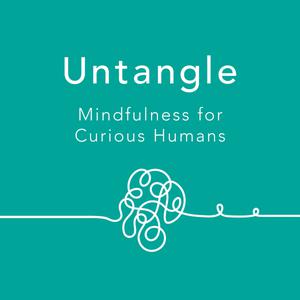 Untangle
Untangle
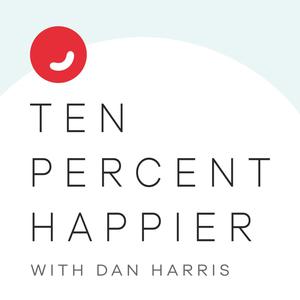 Ten Percent Happier with Dan Harris
Ten Percent Happier with Dan Harris
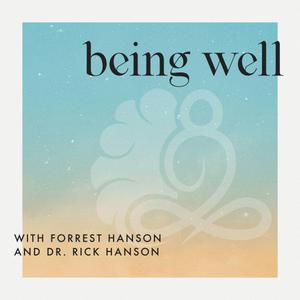 Being Well with Forrest Hanson and Dr. Rick Hanson
Being Well with Forrest Hanson and Dr. Rick Hanson
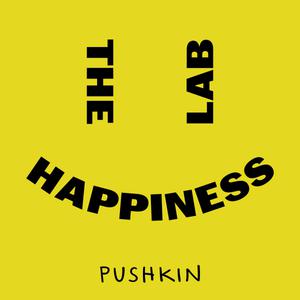 The Happiness Lab with Dr. Laurie Santos
The Happiness Lab with Dr. Laurie Santos
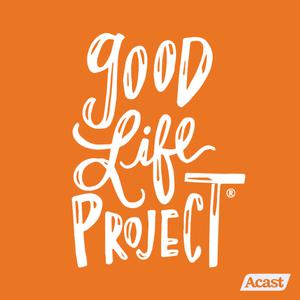 Good Life Project
Good Life Project